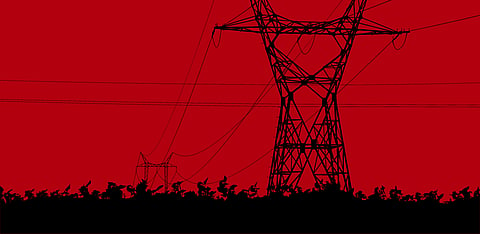

Introducing the Electricity (Amendment) Act, 2022 is yet another example of the Union Government ignoring the states and crossing the Lakshman Rekha of federalism, the People's Commission on Public Sector and Services has pointed out in a press note.
——-
ON June 30, the People's Commission on Public Sector and Services ('PCPSS'), in a press release, expressed its concerns about the Electricity (Amendment) Bill, 2022 that the Union Government is planning to introduce in the upcoming monsoon session of Parliament.
According to the Commission, the Union Government, a few years ago, had unilaterally enacted the three Farm Laws, in addition to introducing the draft Electricity Act (Amendment) Bill, 2020 to amend the Electricity Act, 2003, without taking state governments and farmers' associations into confidence. Since both the laws and the Bill would adversely affect agriculture and farmers' interests, it led to an agitation by farmers from all over the country, which lasted for months. The Union Government found it expedient to repeal the farm laws, when it could not end the agitation launched by farmers through talks.
Despite the fact that the government had assured that neither the farm laws nor the electricity bill would be revived without prior consultation with all stakeholders, recent reports suggest otherwise. "If this happens, the government would be reneging on its earlier assurances. This is yet another example of how the Centre would be ignoring the States and crossing the lakshman rekha of federalism," the press release issued by the PCPSS stated.
The Commission has put forth that the Bill has far-reaching implications on the economy, finances, agricultural and industrial development, and social equity and harmony, which states cannot ignore. The Bill leads to an assault on the federal structure of the Constitution, it said.
Explaining its concerns, PCPSS stated that even though the subject of electricity is placed in the Concurrent List of the Constitution and its entire distribution is with the states, in the reform era commencing from 1996, this sector has been virtually treated as a central subject. States are considered mere vassals as all the policies are made by the Centre and laws are enacted by the Parliament, and for the sake of formalities, so-called consultations are only done with states, the PCPSS has contended.
All the 'reform measures' originate at the Centre and are sent down as directives to the states along with a carrot and stick package, the PCPSS said. "Each and every post-EA-2003 reform measures and schemes were accompanied by stringent conditionalities which state governments had to obey lest they be declared pariah!", the PCPSS noted.
"In the same vein, EB-2022 lays down the reforms in the distribution segment as prescribed by external agencies thereby trampling upon the exclusive jurisdiction of the states. Adoption of these blindly would be against the letter and spirit of the Constitution of India," PCPSS concluded.
Also read: Serious concerns over proposed LIC IPO
The PCPSS has identified nine specific concerns over the Bill. They are:
All these concerns reiterate the need for the Government to consult the concerned stakeholders before taking a decision on the Bill.